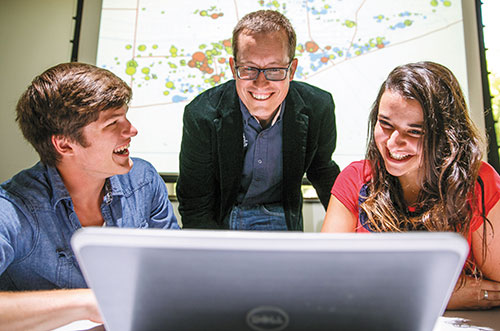Creating a cohesive understanding of the city is key
Every other year, a new group of students take a digital history course taught by Professor of History and Archaeology David Pettegrew. Not long ago, history major Anna Strange ’20 was one of those students. Now, she’s part of the Digital Harrisburg Initiative.
Created in 2014, Digital Harrisburg, a series of projects created by students and faculty at Messiah College and the Harrisburg University of Science and Technology, explores the history and culture of the Harrisburg area. Collaborators unite to build digital projects that create public value for the region.

“This initiative is what the Harrisburg community needs,” said Strange. “Because of the information we gather, we’re able to create a cohesive understanding of the city, which may help the Harrisburg community in the future.”
History major Rachel Williams ’19 says the initiative has been an integral part of her college career. “I met friends, learned more about my interests and capabilities and understood more about the place I call home,” said Williams, a Mechanicsburg native.
She’s studying Harrisburg’s Old Eighth Ward, a residential community the city demolished in 1917 to make space for the Capitol Complex.
That’s the thing about the initiative: Sometimes, it uncovers uncomfortable parts of Harrisburg’s history. The demolition of the Old Eighth Ward displaced the city’s most ethically and racially diverse neighborhood.
Was the demolition just? For Andrew Dyrli Hermeling, Digital Harrisburg project manager, this is where the importance of research comes into play.
“The project has the potential to play a very important role in helping Harrisburg address many of its social issues, especially in terms of how the city and its suburbs have been divided along racial lines,” he said. “And as a college with a commitment to the Christian faith, we should be leaders in addressing such concerns.”
For the project, Professor of History Bernardo Michael focuses his research on racial redlining and topics such as transportation, housing, shopping, dining and entertainment, which are often overshadowed by larger histories in the region. These subjects help to add a strong local flavor to the research, said Michael.
“You see, the institutions we live within and our lives have all been touched by this history,” said Michael. “The history of segregation, exclusion and inequality has a more recent past and might be closer to home than we think.”
A number of important research projects are produced by the initiative throughout the academic year. These projects are posted on the initiative’s website as a blog. An interactive map of Harrisburg in 1900 also contains data developed by Messiah and Harrisburg faculty and students.
“As faculty and students, we work across disciplinary boundaries to make meaningful contributions as we continue to know, explore and learn about the city of Harrisburg,” said Pettegrew, who will continue to teach this course in hopes of inspiring the next generation of Digital Harrisburg contributors.
—Jake Miaczynski ’20